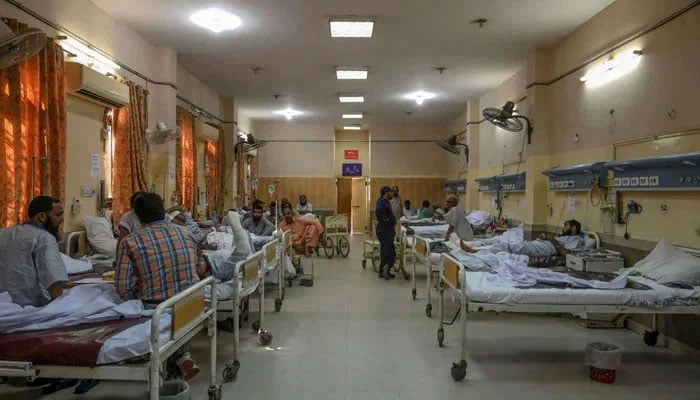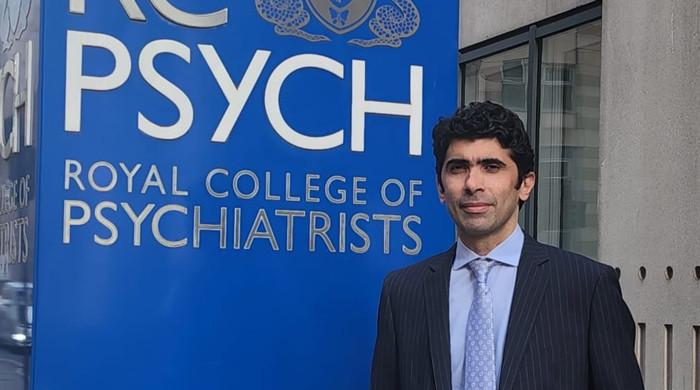Health officials confirm first MERS-CoV case in Pakistan
Patient returned from a Middle Eastern country and was admitted to private hospital in Jhelum on September 4
October 05, 2024

- Disease detected in 55-year-old man hailing from Kharian.
- Patient returned from a Middle Eastern country on Sept 3.
- Was admitted to hospital in Jhelum due to breathing issues.
ISLAMABAD: The country has recorded its first Middle East Respiratory Syndrome-Coronavirus (MERS-CoV), which was detected in a patient last month, The News reported on Saturday.
The development was confirmed by the World Health Organisation (WHO) and the country's health officials to the publication a day earlier who said a 55-year-old man was diagnosed with the potentially deadly disease.
MERS-CoV — not to be confused with COVID-19, commonly known as the coronavirus, pandemic — is a viral respiratory illness first identified in 2012, and has been reported in 27 countries.
The disease has a mortality rate of approximately 36%, although this figure may be inflated due to the underreporting of mild, undetected cases.
Symptoms of MERS-CoV include fever, cough, and difficulty breathing, with some patients developing severe respiratory distress. The mortality rate is particularly high among those with underlying health conditions, such as diabetes or chronic lung disease.
The infection is usually diagnosed through laboratory testing of respiratory specimens, but early detection remains challenging due to the nonspecific nature of its initial symptoms, which often resemble those of other respiratory illnesses.
The Pakistani patient in this case, a tailor from Kharian near Gujrat, had been working in a Middle Eastern country and landed at Islamabad airport on September 3 and was admitted to a private cardiac hospital in Jhelum the next day due to shortness of breath and heart issues.
While he was hospitalised, the WHO and the Middle Eastern country's health authorities informed the National Institute of Health (NIH) in Islamabad that he had tested positive for MERS-CoV after samples were taken in that country before his departure.
However, the country's health authorities initially kept the case confidential, even from the medical staff at the hospital where the patient was admitted. The patient was transferred to Benazir Bhutto Hospital (BBH) in Rawalpindi on September 5, where he remained in the Intensive Care Unit (ICU) for several days. After receiving appropriate treatment, he was declared healthy and discharged.
Following the patient's recovery, health officials tested over 40 individuals who had come into contact with him, all of whom tested negative for the virus.
The patient has since returned home to Kharian, added the officials.
case has added to the ongoing global concerns surrounding MERS-CoV, particularly as it is often transmitted from dromedary camels to humans.
This highlights the continued risk posed by the virus, which has shown the ability to spread between humans, especially in close contact and healthcare settings.
In response to the diagnoses of the disease, Pakistan implemented rigorous contact tracing and monitoring protocols with health officials ensuring active surveillance for respiratory illnesses in hospitals and conducted refresher training for healthcare workers on case definitions and infection prevention measures.
The WHO is also supporting member states in managing and researching MERS-CoV infections through updated protocols.
This incident underscores the importance of rapid public health responses to contain MERS-CoV outbreaks, particularly given the potential for international transmission. While the WHO has stated there is no need for special screening at points of entry, member states are urged to maintain strong surveillance for acute respiratory infections.
Despite the seriousness of the situation, health authorities have advised against imposing travel or trade restrictions related to this case. However, as MERS-CoV continues to circulate among dromedaries, health experts stress the need for ongoing vigilance, particularly in healthcare settings.
Human-to-human transmission has been linked to delays in recognising symptoms and implementing isolation measures, highlighting the critical need for early detection and swift responses to potential cases.
As the world continues to battle respiratory infections, including COVID-19, maintaining awareness of MERS-CoV remains crucial. Public health education, hygiene practices, and responsible interactions with camels are key to preventing the spread of this dangerous virus.











